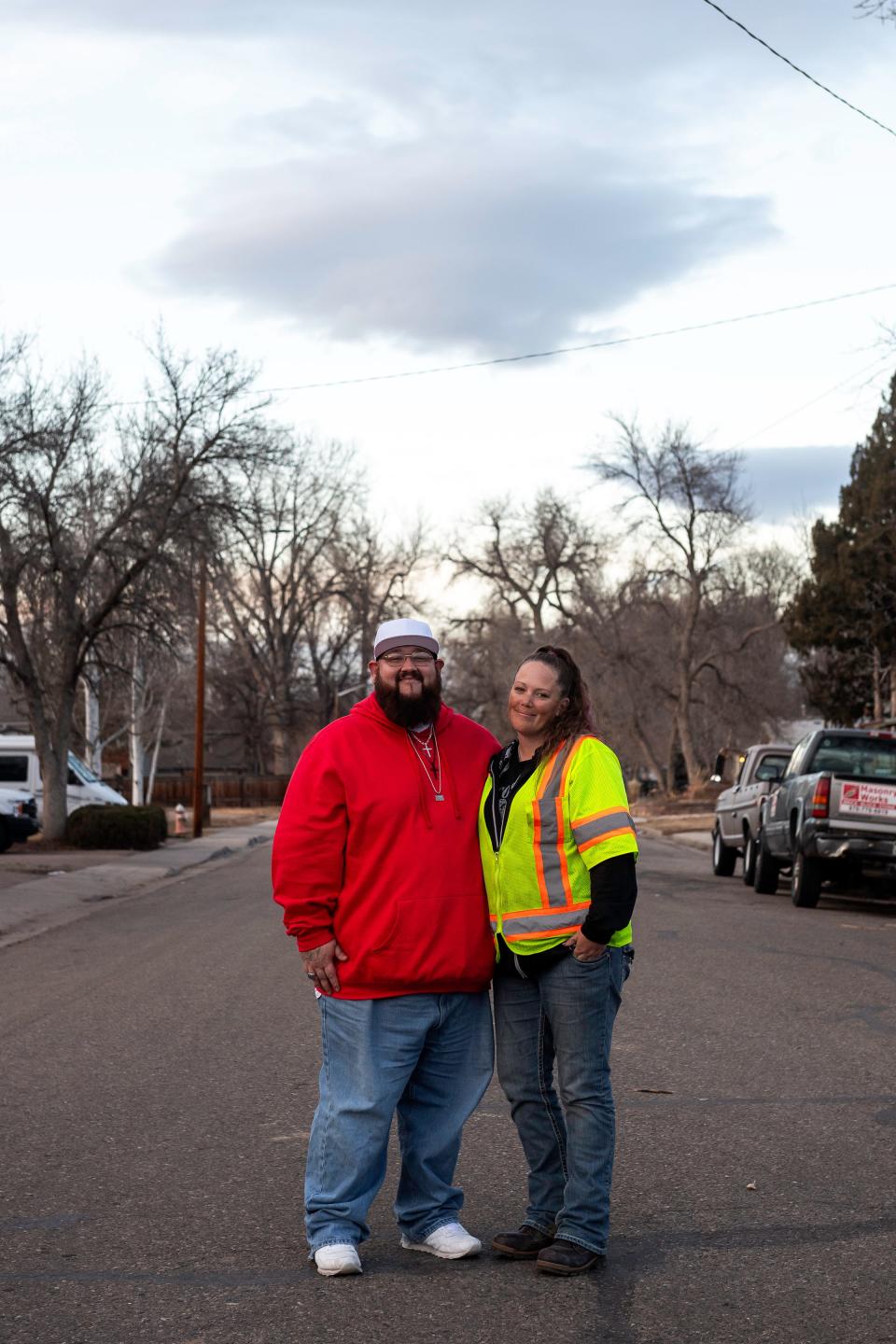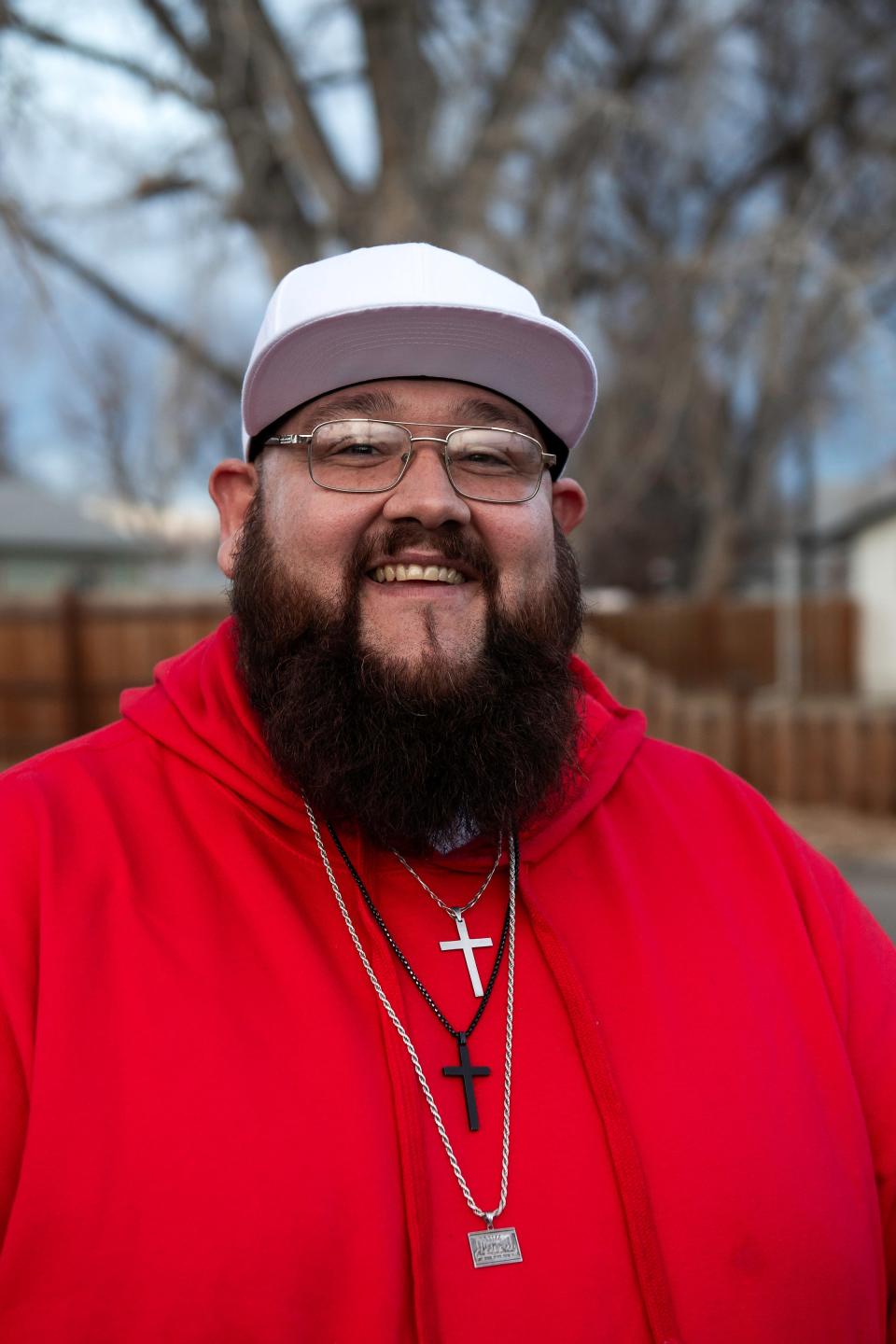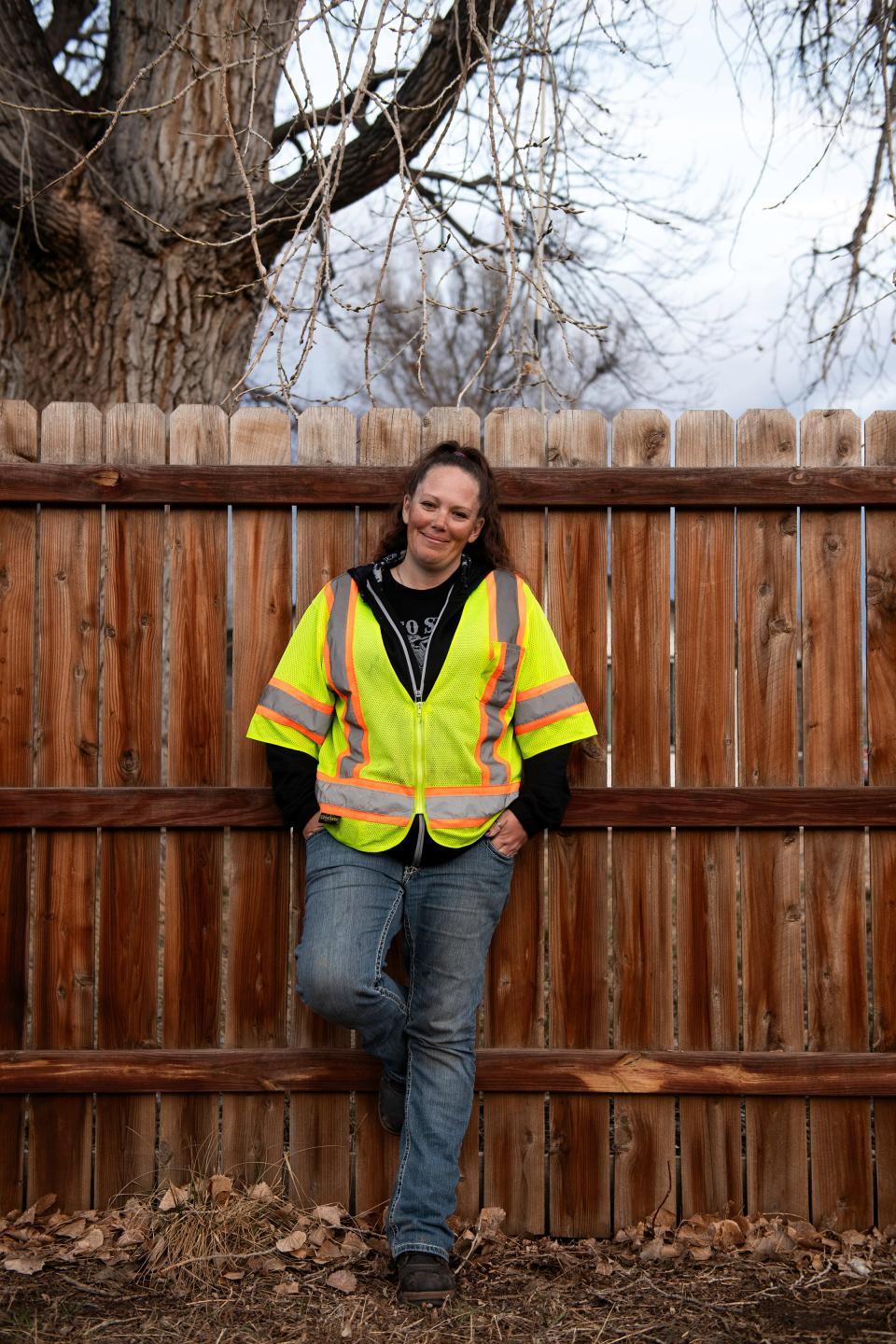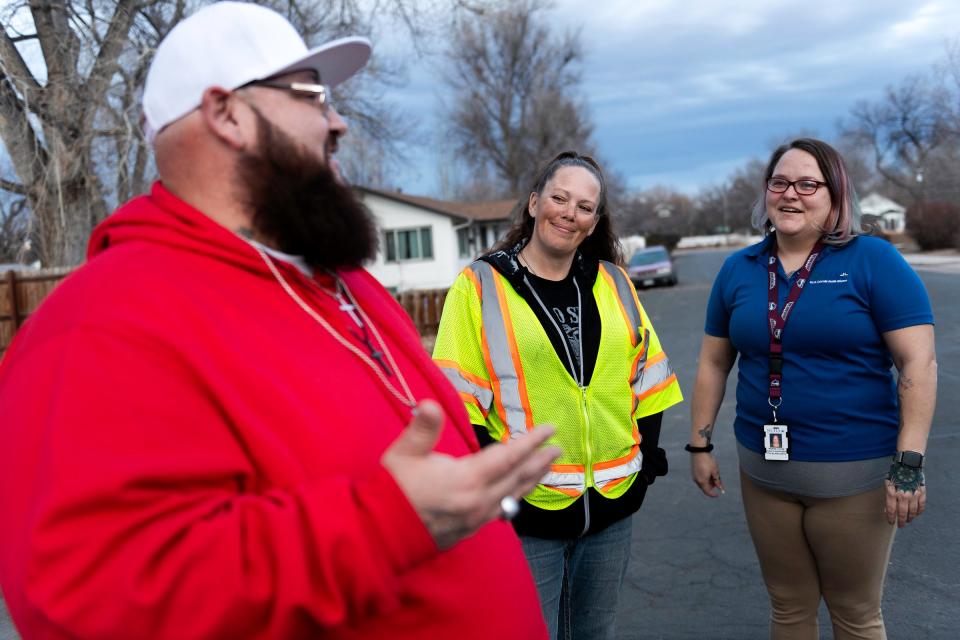'You don't have to give up': How Stone Soup supports people leaving Larimer County Jail
Meggie Branch said she wouldn't be where she is today without the substance use treatment she got in the Larimer County Jail.
On June 21, 2022, Branch had just been arrested for felony eluding after she said she led police on a high-speed chase. She had already been convicted of multiple felonies and was on parole at the time of her arrest. Branch said her "family gave me so many chances," but she had "burned those bridges" and no longer had them to lean on.
“I thought I was going back to prison,” Branch said. “I thought no one was going to give me a chance.”
Branch, 38, said she had been using drugs for more than a decade, starting with pain pills when she was 24 and moving to heroin and fentanyl in 2019.
Branch said she was "in and out of jail a lot" between 2019 and 2022, and it was during that time that she discovered she had right side heart failure due to her drug use. Even that diagnosis wasn't enough for her to quit. Branch was never arrested or convicted of a felony drug charge, so court-ordered treatment was never offered to her as an option.
“While I knew I needed help, there was nothing really out there or anyone willing to help me,” Branch said.
But Branch said this time was different.
Branch was approached by Alyssa Cross, a care coordinator with the North Colorado Health Alliance, to take part in the medication-assisted treatment program at the jail to treat her substance abuse disorder.
But Branch said she didn't want Cross's help at first and "in not so nice of terms" told Cross to leave her alone.
"It took her probably four or five times of her coming back and not giving up on me," for her to accept Cross's help, Branch said.
With Cross's persistence, Branch started medication-assisted treatment in June 2022. She has been sober since.
Branch said Cross continued to support her as her court case proceeded and advocated for a probation sentence, which she received. Cross helped get her into a sober living house when she was released, and Branch was connected with her peer mentor, Hans Joseph Pearson.
"Without all of that, I don't know if I would be in the same spot that I am right now," Branch said. "I kind of doubt I would be."

The North Colorado Health Alliance is one of more than 30 community partners working with the Larimer County Sheriff's Office to help incarcerated people transition back into the community and prevent recidivism through the Stone Soup Community Reintegration Initiative.
Colorado has one of the highest recidivism rates in the country, Cross said, with 50% of incarcerated people arrested again within three years of their release.
The Stone Soup initiative aims to address the reasons why formerly incarcerated people recommit crimes — including substance use and family support — and provide support as people leave the jail, Stone Soup program coordinator Janelle Goodwin said.
The name "Stone Soup" comes from a European folktale in which a traveler comes to a community and asks people to share a small amount of their food so the stranger can make a larger meal to share with everyone, “and before you know it, you have this beautiful, delicious soup that’s enough to feed the whole community,” Goodwin said.
“We’re all coming together as one another, trying to be really creative and innovative in the ways we’re approaching these really big issues,” Goodwin said. “Each of these community partners brings something to the table, an ingredient if you will, for the soup. ... We can draw on the strengths of our community partners to really wrap around and really make sure they’re getting everything that they need.”
How the Stone Soup initiative tackles recidivism
The Stone Soup initiative takes a "holistic community care approach" to reentry, Goodwin said. "That means we're looking at the problem of recidivism from all angles, or attempting to."
Care coordinators create personalized reentry plans for inmates based on what each person needs support with upon release. That could mean helping someone sign up for health insurance so they can continue medication-assisted treatment for their substance use or helping them find housing or employment. The Stone Soup initiative aims to make sure people are connected to these resources before they are released from jail to increase the likelihood they'll be successful and not end up back in the criminal justice system.
“All our programs begin here in the jail, and they continue with the same community partner on the outside so they have that sort of seamless transition in the community,” Goodwin said.
“We’re trying to stop working in silos."
Goodwin said they hope to be able to reduce recidivism by 5% a year.
This program started with those involved in the medication-assisted treatment program in the jail — which typically consists of about 30% of the jail population — but care coordinators can work with anyone who may need support when they are released, Goodwin said.
Last year, almost 1,000 people utilized the jail's medication-assisted treatment program while in custody, Cross said. Medication-assisted treatment helps with withdrawal symptoms and curbs cravings by treating the physiological needs of the person who has the substance use disorder. While medication-assisted treatment isn't for everyone experiencing opioid use disorder, Cross said she's seen it work well as "a safety net" for many people in recovery.
The Stone Soup initiative's programming aims to address the reasons why people commit crimes — referred to as criminogenic needs — to prevent people from reoffending, Goodwin said, including substance use, housing, employment and family or social support.
Other programming through the Stone Soup initiative includes:
Programs for inmates' families "so there's a stable family unit to return home to" once they are released, Goodwin said.
Partnering with Unified Workforce for job placement, which follows individuals for a year after placement to ensure it's a good fit.
Community outreach and education initiatives aimed at trying “to make the community a more welcoming place for people returning from incarceration," Goodwin said.
Staff training on trauma-informed care to support successful reentry into the community.
“There’s a lot of stigma associated with incarceration and oftentimes people, even when they’re striving to make different choices in their life, they’re met with a lot of barriers and closed doors because people just don’t want to take a chance on them,” Goodwin said.
The Stone Soup initiative received a $600,000 grant from the Colorado Attorney General's Office in January as part of the Opioid Abatement Innovation Challenge Grant. That funding will support the Stone Soup initiative's programming with CorrHealth, North Colorado Health Alliance and The Willow Collective addressing the opioid crisis over the next two years.
The grant funding will go toward continuing and creating new programs to support successful reentry, as well as a new medication option for those participating in medication-assisted treatment.
Currently, clients take medication daily, but the grant funding will allow the jail to provide monthly injections for this treatment instead, which Goodwin said will lessen the workload for staff in the jail, and clients will be able to continue the same medication once out of custody.
The grant will also fund a research study through the Butler Foundation for Families out of the University of Denver that will identify what programs are effective and where gaps in resources exist. The long-term goal is to be able to replicate their work in Larimer County at other jails in the state.
Peer mentors show 'there is life on the other side of addiction'

A major factor in whether someone reoffends is who they socialize with after they are released, Goodwin said. That's where peer mentors — people who also have experience with incarcerated and/or substance use disorder — are making a huge difference, Goodwin said.
The program pairs inmates with peer mentors who have been in their shoes to help guide them through the transition of getting out of jail and back into the community.
Pearson — Branch's peer mentor — said becoming a peer specialist through North Colorado Health Alliance has "given me a career from some of the hardest parts of my life."
Pearson said he started his recovery four years ago after he almost lost his hand when a vein ruptured due to his substance use. He spent 11 days in the hospital, and when he made it through with some use of his hand, he realized he "had more to live for" and started his recovery journey.
"That was the first time I cried out to God," Pearson said. "I needed saving."
Pearson became the North Colorado Health Alliance's first peer specialist at the end of 2020. He now has a case load of about 30 people — including Branch — who he said he works with to develop trust and help guide them to the resources they need. Sometimes that's treatment, other times it could be someone to lean on during a hard day or hard time in their life, he said.
"We're not going to help everybody, but we want people to know where to go when they need help," Pearson said.
Pearson said peer mentors can show others in recovery "there is life on the other side of addiction."
"You're ending one life and beginning another, and to not have anyone walk you through that is a very scary thing," he said. "... It's having a peer who's been where you've been that helps and motivates in a way that you're not going to get from any other type of person."
'You don't have to give up'

This June, Branch will be celebrating two years sober. In those two years, she said, she got a job and has worked to rebuild relationships with her family, including her mother and her 18-year-old son.
"It's overwhelming some days, but other days you don't even really think about it," Branch said.
Branch said she is still close with Pearson and Cross and knows she can call them whenever she needs something or just wants to chat — which she does often.
"To watch her grow has been a very beautiful and amazing thing to watch," Cross said.

Having their support during recovery has been instrumental to her success, Branch said. She said Cross is helping her apply to places in Northern Colorado to become a peer specialist herself so she can help others the way Cross and Pearson helped her.
"If I can do even a little of what Alyssa and Hans did for me for somebody else or for a few other people, I just want to show people that no matter how bad it is, you can turn it around and you don't have to give up," Branch said.
This article originally appeared on Fort Collins Coloradoan: Stone Soup supports those leaving Larimer jail to reduce recidivism

